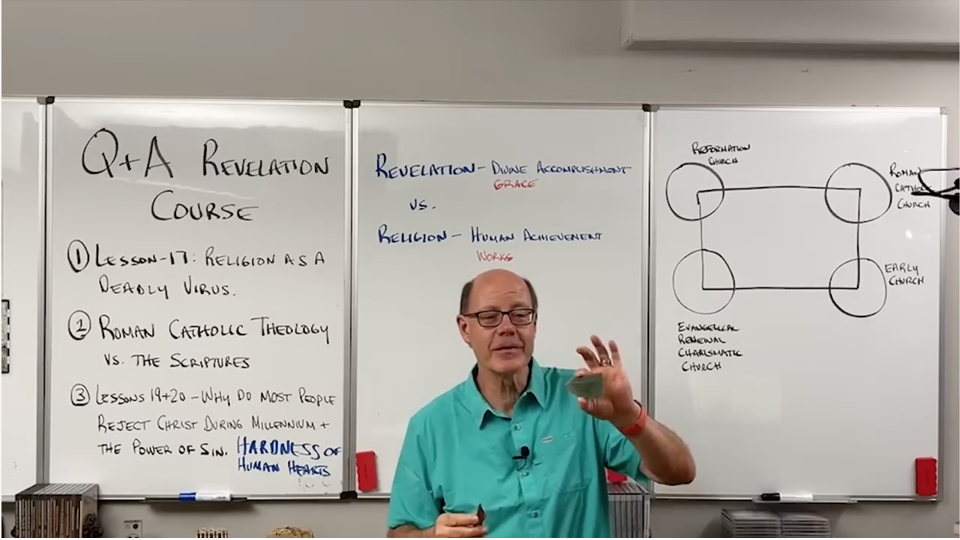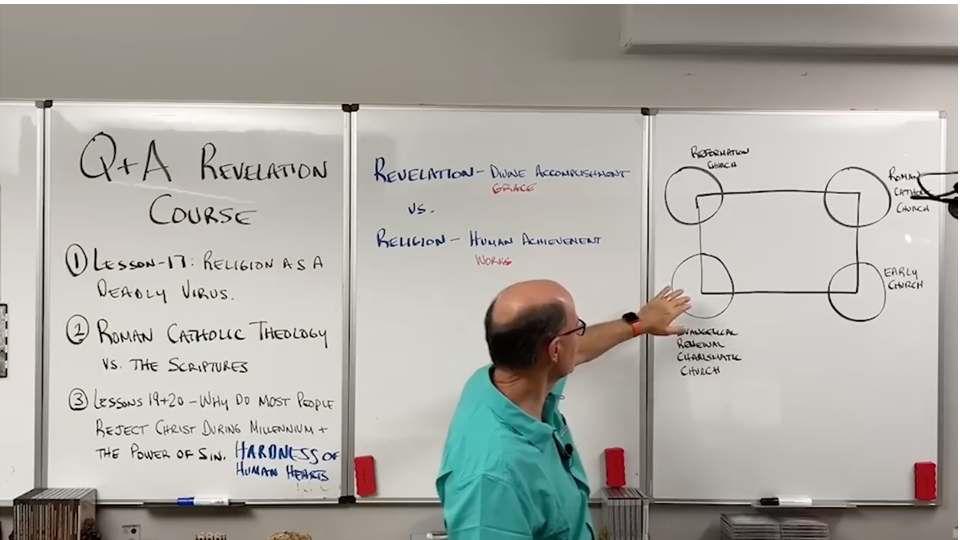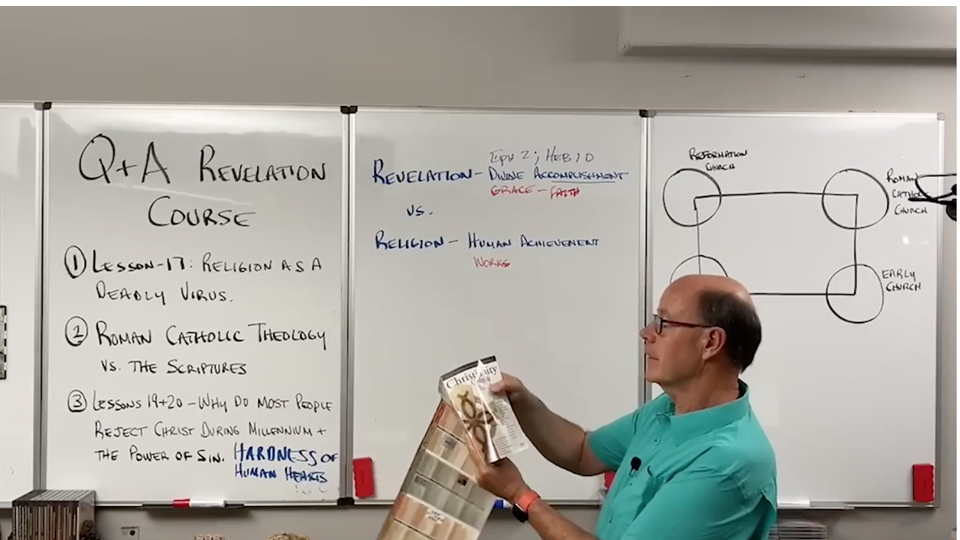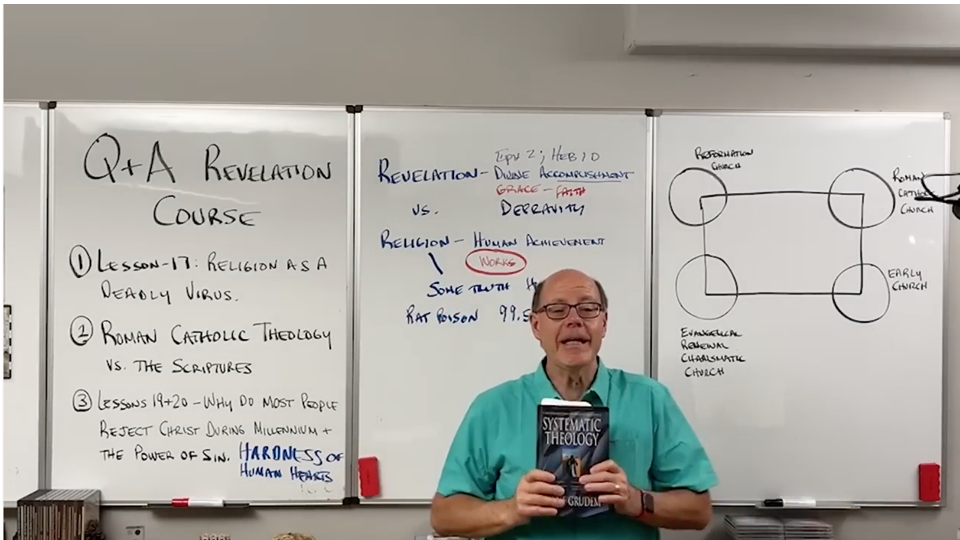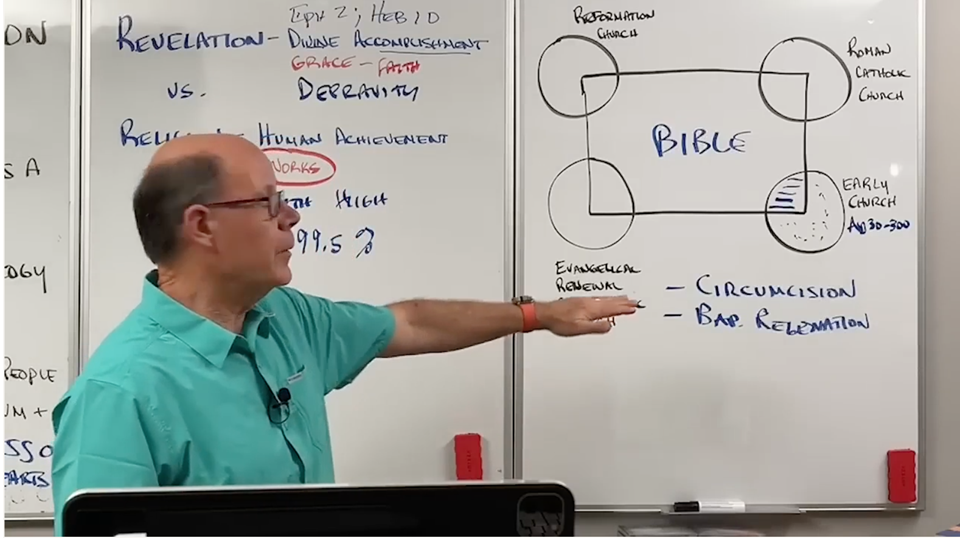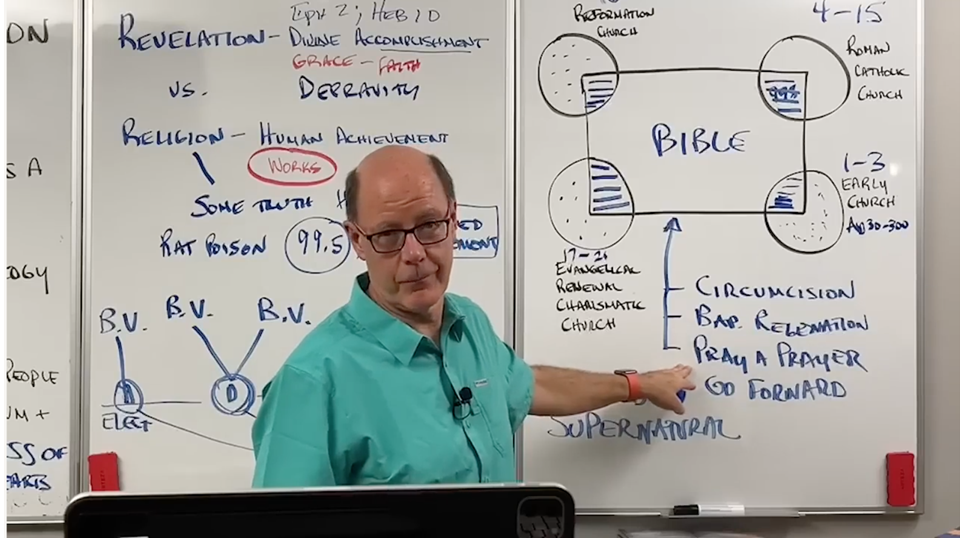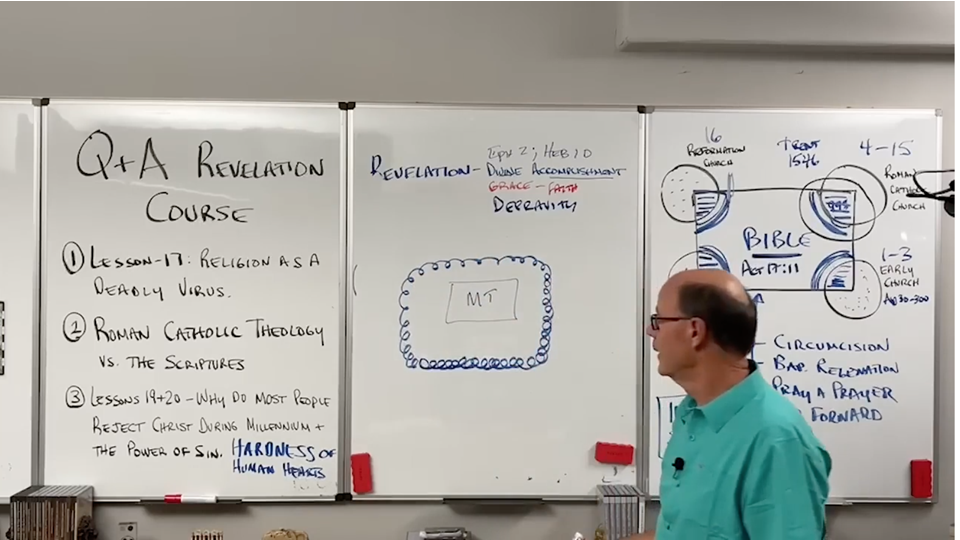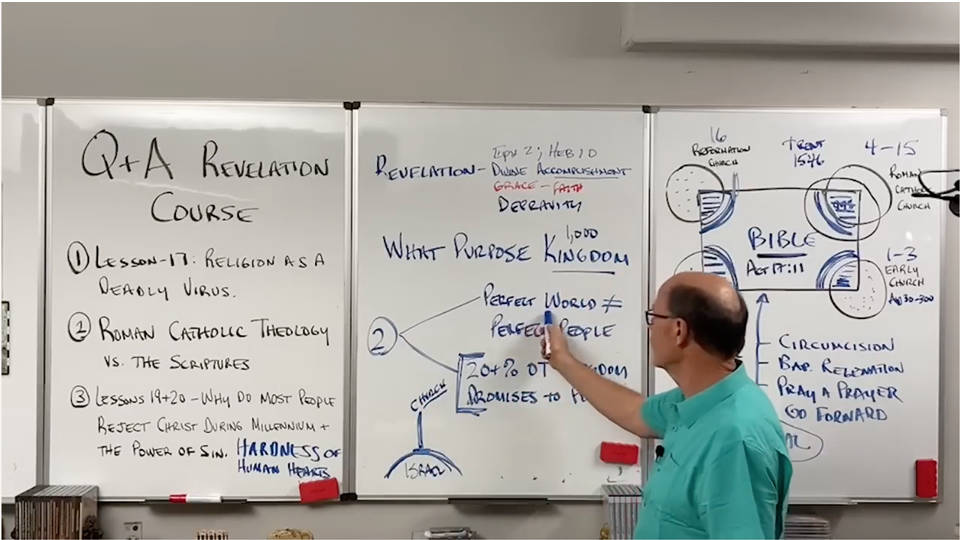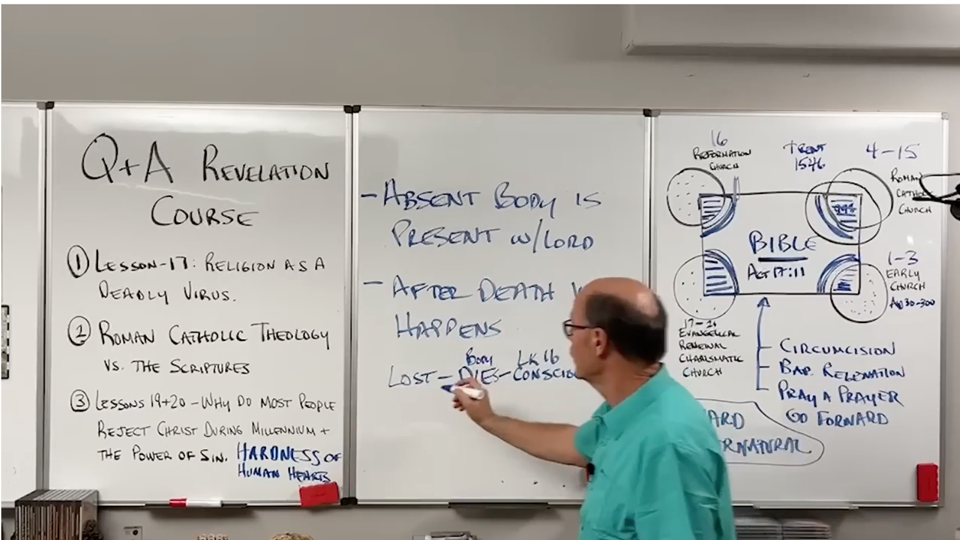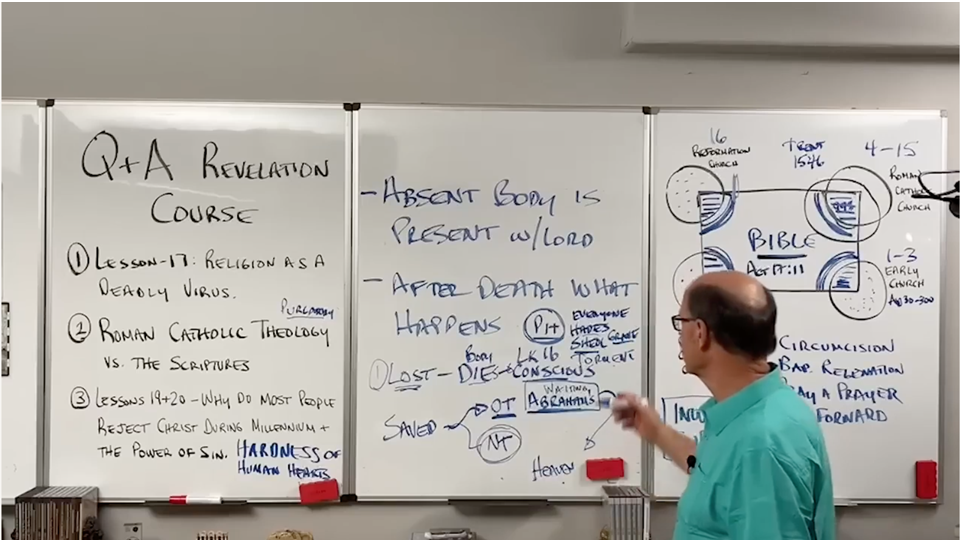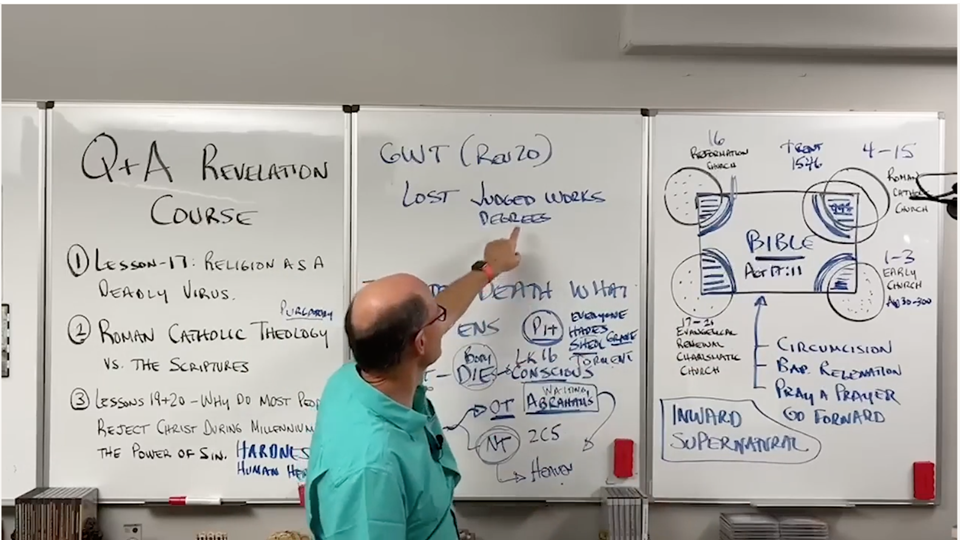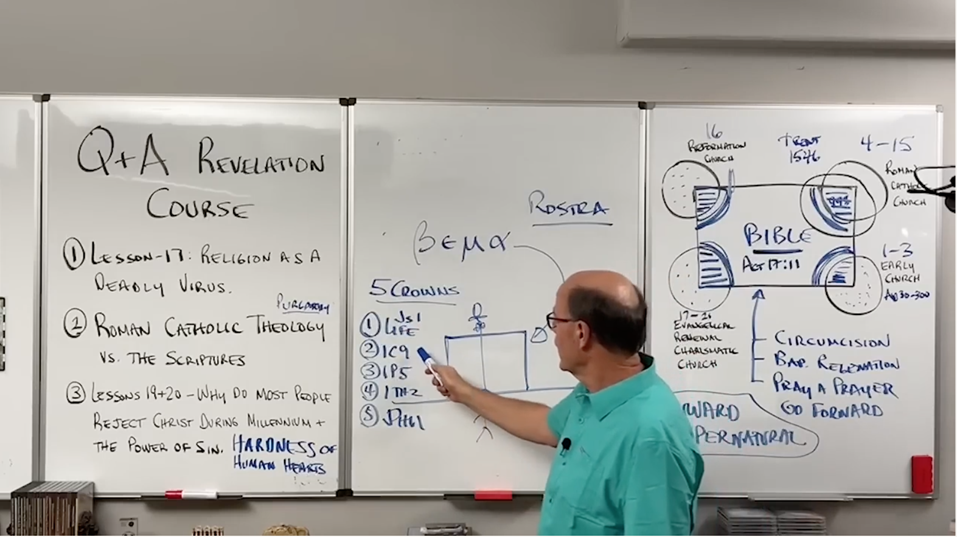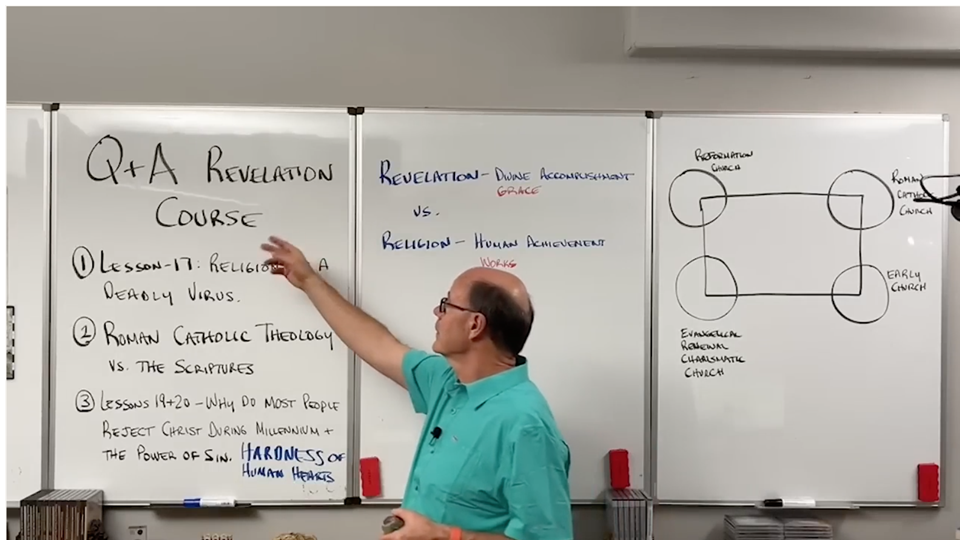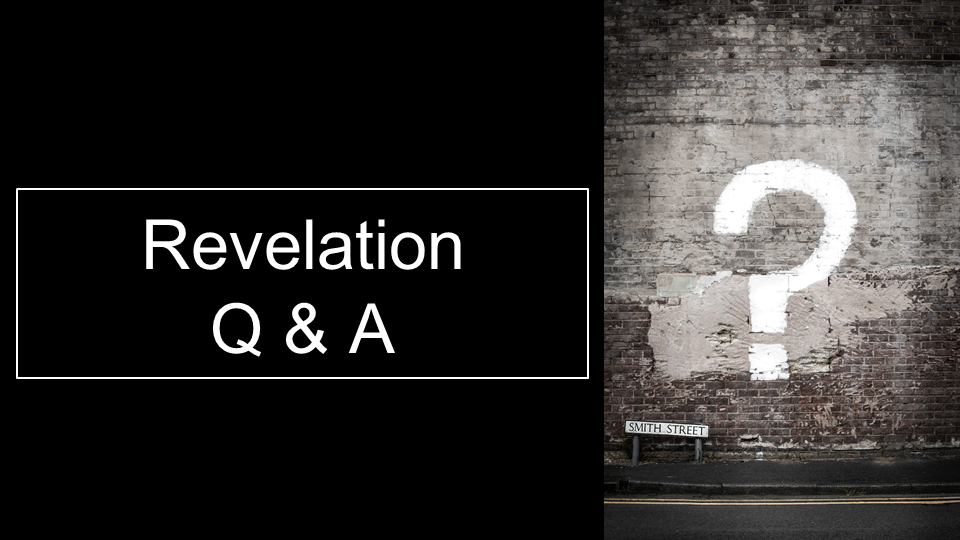WOL2022-REV-21
220627AM
Transcript
Since we’re covering Revelation, I wrote down from Jim, his message to me, this was your wrap up questions on the Revelation course. Since I’m in the studio and not in your living room, I’m going to show you a few of my props. Every time I go to Jerusalem I go to a rock shop that sells stones that have to do with the Bible. I looked up the word in Hebrew from the book of Revelation chapter 21 the colors of the foundation stones and I bought two of them. This is the red color of one of the foundation stones and this is the green, but they have Hebrew written on them. I used to be able to read it fluently, but it says something like tissa, so I have no idea what that means. While we’re talking about Revelation, these are two of the colors of Heaven that God revealed to us. Isn’t that amazing? God likes greens and reds, so I use that in my props.
The three questions I have I’d like to cover them quickly. You said from lesson 17 that you had a big discussion about religion as a deadly virus. I don’t know about the class because there’s one class online, but I’ve taught Revelation 20 times and the editors have trouble knowing which one to put online. I never say the same thing twice, as Jim knows from all of our years together. I usually cover the difference between Revelation and religion. Revelation is the inspiration of God’s word and religion is the human packaging of those truths. I want to go over that for question one.
Then you said I talked something about Roman Catholic theology and what I said the scriptures say about it. With that, this is my synopsis of Church History. In my early grad school, I worked for five years on my Ph.D. in Church History, my big thing was Church History. Yesterday, you can’t see it, but I took out all of my notebooks. I taught seminary level Church History, history of theology, Church History, heretics, cults, and all those things. I was looking at the notebooks and I thought, I still agree. This is the shortest summary of Church History going from the Early Church in the New Testament to the Roman Catholic Church by the time we get to the 4th century, to the Reformation Church in the 16th century, to modern times. To cover your second question I’ll do my little graphic over there.
Then this one was fascinating, and I was talking with Kirk about it. In lessons 19 and 20, Jim, you said something like, why do most people reject Christ during the Millennium? I guess what you said is you were shocked that most people did, that the Bible says that. When I was talking to Kirk I mentioned the power of sin, but what it really is, is the hardness of human hearts. That’s what’s staggering to me.
I guess the older I get, I start thinking about how much I know from God’s word and how hard it is to obey it. I have, just like you, the Holy Spirit living inside of me, I know Jesus Christ personally and yet sometimes I go love my enemies. When they’re screaming at me? Call down lightning, Lord, get ’em! As a believer, I am still amazed that my human heart is still easily hardened. I’ll go through those three. Let me do these in order and I’ll stop after each of your questions, and you tell me if that’s enough and then I’ll go to the next one. Then I’m going to hope to finish with any other questions you have.
In chapter 17, I talk a lot about religion as one of the two viruses Satan has. Materialism, I think all of us are pretty content that materialism dominates in the world. However, religion is really hard because all of us were born with a theological framework, a grid of some kind. For me and you all know this from my stories, my parents met in a bar.
My mother was somewhat of an alcoholic. My father could drink an awful lot. My grandfather died of cirrhosis. My other grandfather died of cirrhosis. I’m from a multi-generational alcoholic family. I don’t have a family Bible here, but this pastor of a Baptist church would go visiting with a family Bible under his arm, one of those great big ones that are about this big, because he wanted everybody to know what he was doing. He carried around a family Bible and would knock on doors.
My mother was drinking out of a one gallon bottle. Can you imagine? That weighs like eight pounds. I don’t know how she balanced it, but she was drinking. He knocked on the door. She said come on in, it was a screen door, and she said he put that family Bible down and opened it up. He said I’m the local Baptist minister from Okemos, Michigan. Can I talk to you? She said, yeah, she was quite happy with her gallon, and he led her to Christ. My father came home and there was a different person in the house. It’s amazing. She didn’t want to go back to drinking with him at the bars that fast. Some people are radically converted and for some people, it seems to take a long time. He came back, this pastor, and started working with my dad so that shapes my life. That’s my earliest view of Christianity, this door-to-door, big Bible, sharing the Gospel, changed life. Some people weren’t like that. They’re more in the refined, slower Christianity.
Religion, what I’m talking about with this is the contrast between Revelation, which is the truth of salvation God revealed, and Ephesians 2:8-9, “For by grace you have been saved through faith, and that not of yourselves.” It’s a divine accomplishment. I always write down Ephesians 2, and Hebrews 10 says for by one sacrifice forever we were forgiven through Jesus Christ, one sacrifice. I call that divine accomplishment.
In other words, God said He did everything, and the only way to get it is by grace through faith, let me find my red marker, through faith. Religion, every religion in the world, everyone has all of these elements of human achievement that you have to do and you’re never sure when you’ve done enough.
Since I have you in the studio for the Q and A, I’m going to show you some of these resources we use in our 52 chapter study. This one, all of these that I use are by an outfit called Rose Publishing like the flower rose, but this is what we use when I’m in my 52 chapter study. It’s Christianity, cults, and religions and it starts with biblical Christianity and then Jehovah’s Witnesses, Mormonism, Seventh Day Adventism, Unification, Christian Science, Unity, New Age, Wicca, Scientology, and the backside has even more. Islam, Baha’i, Judaism, Hinduism, and a lot more, and Buddhism. Every religion has something like the five pillars of Islam, you’ve got to do your alms and go to Mecca, but what they are, are works. Religion is Satan countering what God revealed and that’s what makes most people reject Christ. Most people say that I can do nothing to receive salvation doesn’t seem right.
I think another thing I might not have emphasized in chapter 17 is our depravity. That’s part of the hardness of our human hearts and the power of sin. In chapter 17, Satan’s lie is that all religions have some parts of the truth. For example, with Hinduism you get into some of those and there’s very little biblical truth in there, but the more refined kind of Western religions have high percentages of truth. I don’t know if I said this in lesson 17, but rat poison is 99 point something percent grain; wheat, or whatever. It’s the point five of strychnine that’s the killer. This works, any work is the killer. I’m not talking about post salvation good works because Ephesians 2 says we’re created in Christ Jesus for good works. That’s after salvation. Before salvation, no works can get us to Heaven and that is unpalatable to religion. Maybe when I get into the second question and look over here at this chart I’ll go more into it, but I don’t want to use my whole time on one question.
I’ll just throw in that if you look at the history of the Church up until Diocletian’s time, they didn’t really have buildings. They were meeting in their homes. Once we started making these huge structures, we had to have a lot of rules; who can come in my structure and how do we pay for my structure? Christianity changed when it went out of homes and into buildings.
One thing I’m happy about is the more hostile our world gets, the more small groups like what you’re doing are going to be the real growth place for a lot of people, especially if the time comes that Christianity in America is taxed and is not tax exempt. These sprawling mall sized facilities are going to be inoperable. I don’t think they’re going to be supportable. When I teach down here, the 52 greatest chapters, I’m telling everyone of those groups that you need to start meeting with a small group. That’s where the accountability is, that’s where your prayer partners are, and that’s where your accountability for growth is.
In Revelation, did I show my journal and everything? Did I show that to you guys? I really emphasize that you need to have someone that you’re saying to, this is what God’s working in my life, but that’s what the Early Church was like. Once we got into institutionalizing and religion we started saying you’ve got to do all these things to be a part of our facility. It’s amazing how many people are good at doing and they lost that personal accountability. They lost the reading of the Bible. They lost all that. Okay. Any other questions on number one? I’m not sure I listened to everybody.
One of the reasons why I use a resource like this one, Christianity, Cults, and Religions, is it makes a comparison with what the Bible says with all the religions like who is God, who is Jesus, who is the Spirit, how do you get saved? That’s the one like Brian was just saying, be baptized to be saved, that’s the Jehovah’s Witnesses. Let’s see, Seventh Day Adventism salvation is by grace, but maintained only by Sabbath keeping, going to church on Saturday. Each of these is what you said Brian, Christ plus, and you can’t be sure you have it unless you do the plus. That’s vital.
Let me then, Jim, go to number two, Roman Catholicism. I don’t know if I ever told this story, but probably one of the sweetest memories I have was ministering in 1979 in Poland, in Kraków Poland, delivering 1800 Bibles. Do you know who we delivered them to? A Roman Catholic priest who watched over the shrine of Mary in Kraków Poland, which is visited by hundreds of thousands of people. This priest was so dear to me because he was risking everything to let us come and deliver Bibles to him.
What he asked for the first time I met him was for 10,000 Gospels of John. I don’t have one here in my props, but the Gospels of John were a little pamphlet. The Gospel of John is only 21 chapters, so they were just little paperback books and we brought him 10,000 of those in Polish, to the priest, right to the place he lived. I don’t know what it’s called, the rectory or something. At night in the dark, because he wasn’t supposed to be doing this and the Polish government was watching, us college kids were carrying these in and I said, what are you doing with these? He looked at me and said I have a personal relationship with Jesus Christ, but many of these people that come to my shrine are weeping and hoping and unsure of anything. I come one at a time to them when they’re on their knees and I say, have you ever read the Bible yourself? A lot of them say, not all by myself. He says I have, and this is the best thing you could do, read the Gospel by St. John.
He said I will personally talk to everybody kneeling at that shrine and tell them they need to be born again if you will give me 10,000. He said we have a hundred thousand a year, but I’ll probably only talk to 10,000 a year. I looked at him and I thought you’re more zealous than a lot of Baptist ministers I’ve met. He was sharing the Gospel with every one of those people. He was not saying they weren’t saved, but he told me, I don’t think they understand how to directly be connected to the Lord.
Let me go through Roman Catholic theology. The first thing I’ll share with you is this: if you’ve never looked at Systematic Theology, and I talk about Wayne Grudem all the time, you should. Wayne Grudem is a very solid five point plus Calvinist. The reason I recommend him is this: this is a Systematic Theology. It has 1400 pages. For every one of the major divisions of Systematic Theology, he covers what the Anglican Episcopalians believe, what the Armenian Wesleyan Methodists believe, what the Baptists believe, what the Dispensationalists believe, and what the Lutherans believed. I mean what they write in their theologies. What the Reformed Presbyterians believe and then the last of the Protestants he calls the Renewal Charismatic Pentecostal. That’s the top half. The other half is traditional Roman Catholicism, like Ott, he’s a famous theologian from 1955. Then the post Vatican II; McBrien in 1980 cataloged all Roman Catholic theology.
What I like about this is in every chapter, like this is the Trinity and he goes through the Trinity with drawings and everything else, he shows what every part of Christendom teaches. What he points out is whenever they teach something, that’s not in the Bible, but it’s in their theology.
Roman Catholic theology versus the scripture is much like what I just told you about my Polish priest. The Polish priest that I knew in the 70’s was a soul winner, we would call him. He was zealous. He said I’m going to talk to every person kneeling in front of that shrine and ask them, have they ever read the Bible, and could they say they know Jesus Christ personally? Then he said I’ll get my Gospel of John and say Jesus said you must be born again, and I’ll hand it to them. Now, that’s different. I’m not sure all Catholic priests are like that. I know that all Protestant ministers are not like that. Many of them don’t even hold to the authority of the scriptures in churches today. There’s a wide difference in our experience, but let me run through and I’ll stop at the end of this so you can ask questions.
This is my thumbnail. I’ll try to do it in two or three minutes. This is the Early Church. This is from AD 30 to 300 I’d say, and the Early Church was well taught. By the way, this is the Bible, the square, so the Early Church had many solid biblical teachers. They were taught by the apostles, and some of them knew Jesus Christ personally. As the generations went on, they would pass on the truth. They’d read the epistles, but the Early Church started developing all this stuff that were traditions, not in the Bible.
The earliest heresy was baptismal regeneration. The Jews had a problem with circumcision. They believed that if you were circumcised, no matter how you lived, you were going to Heaven. Remember that’s what Jesus said. John 8, Jesus said Moses has taught you circumcision, but I can raise up from these stones. Jesus just confronted them by saying they were not living a transformed life. They said we’re circumcised. Everybody that is circumcised, that’s a descendant of Abraham is going to Heaven and Jesus said, no, they’re not. Boy, did they get mad.
The first heresy that developed in the Early Church was baptismal regeneration. Remember Jesus’ disciples baptized others. He told them to baptize. Jesus didn’t baptize, but his disciples did. Peter commanded people to be baptized. The Early Church started being much like Judaism saying if you’ve been baptized, you’re going to Heaven. That again is back to this religion. That was the first time the Early Church dipped into religion. They said, if this work has been done by your parents, the parents baptized the child at birth or early on, that became the very first of the heresies.
By the way, we have a new one that came around in the 19th century. I call it pray-a-prayer or go forward. It’s invitationalism. There are three terrible problems that the Church went through. Circumcision saving you, baptism saving you, or I prayed a prayer. All three of those, Jesus said, only affect you on the outside. He said salvation in the Bible has to be inward. It has to be supernatural. It has to be a new heart. The Early Church did have errors, they were pretty solid, but they had errors.
We get to the Roman Catholic Church. I would say that 90 to 99%, I don’t know, I’m not good at percentages of Roman Catholic theology, Grudem says is absolutely accurate. It’s this half percent of works that started creeping in and that’s what precipitated the Reformation by the time we get to the 16th century. Martin Luther said wait a minute, that doctrine you have is not in the Bible. Do you remember all of his debates? He got all the theologians together and Martin Luther debated them and said unless I can be convinced from the scriptures I am not changing.
The Reformation Church started, but guess what? They were very solid with their Bible, just like the Early Church and just like the Roman Church, but they started something that is another challenge. I don’t know if I told you about this in class, but I call it theological drift. Here’s a Bible verse. Here’s a Bible verse. Here’s a Bible verse and you can get a truth, a conclusion, or a doctrine from Bible verses. That’s what we’re supposed to do. That’s what systematic theology is about. What does the Bible teach? So, this is doctrine connected to scripture, but watch what happened in the Reformation. They made conclusions from conclusions and that is called theological drift. It may or may not be true, but it is certainly not tied to the scriptures.
That’s where we get a highly contested doctrine called limited atonement. Did you know that the Bible has no verse that specifically says Jesus died only for the elect? However, the Bible does say He died for the world, and He does say that all the Father gives Me, in John chapter 6, will come to Me and no one can come except the Father who draws them. I could go over here and say that it says that we are chosen in Him before the foundation of the world. What happens is if you take those truths all from John and 1 John and 1 Peter, you can come down here and say that Jesus died on the cross only for the elect. The Bible never physically says that anywhere in the whole book. It does say that He chose us. It does say that no one can come except those He draws. That’s the problem over here, that all of a sudden the Reformation Church started having this drift.
By the way, they were highly political. Martin Luther sided with the nobility in the battles over the serfs. Zwingli had an army. Calvin had capital punishment in his church. If you did not agree with the doctrine, they killed people. Servetus, they burned him at the stake for not believing correctly. The Reformation Church got into politics, sadly. Zwingli died on the battlefield. He was a reformer, and he was fighting.
Then we get here. This is fascinating. This is modern times. This is the 16th century, this is the 4th to the 15th century, and this is the 1st to the 3rd century. From the 17th century to modern times, the 21st century, we have this Evangelical Renewal Charismatic Church. The growth of the Gospel is going out through England primarily, and through missions all over the world and across Europe. Look, the same thing happened nowadays.
Something that the Reformation Church didn’t do that the New Evangelical Church did is invitationalism. People were told if you just come here you will be saved, if you’ll raise your hand, if you will pray after me. What was not emphasized was that you are not saved if there’s no inward supernatural transformation. No matter how many times you raise your hand or pray or come forward or get baptized or be circumcised, you can do those things, but they don’t save you.
See, the essence of salvation is not what I’ve done; it’s whether I am holding onto what I could never do, what only God can do, what Jesus did. See that is received graciously by faith. If that really happens and there’s this supernatural inward change, I’ll start doing good works because I want to be just like Jesus Christ, who went about doing good everywhere He went.
All the iterations of the Church, all of the denominations throughout all history have had varying degrees of biblicality or whatever you want to call it; solid, Orthodox doctrine. All of them from the Early Church through the advent of Roman Catholicism, through the Reformation Church, which is Lutheranism, Presbyterianism, all of that through the modern Evangelical Charismatic thing, all of them have both halves.
This is what we’re supposed to do, Acts 17:11, we’re supposed to examine the teachings. The Bereans checked what Paul said. Every saint in the Middle Ages should have checked what they heard at the cathedral against the Bible. Everybody should have checked against the scriptures what Calvin and Luther were saying. Today we should check against the scriptures.
Does that mean that everybody in the Reformation Church was saved? No. Does it mean that everybody in the Roman Catholic Church was not saved because they had the works thing in there? No. Just like my priest in Poland. I would say that until 15, what year was Trent? 46? I don’t know. Roman Catholicism wasn’t even codified. It wasn’t even written down until Trent. It’s hard to talk about Roman Catholic theology in the scriptures until right here when it was written down. It’s not what we experience with our favorite church we go to, it’s what the official doctrine is. That’s why this, Systematic Theology, is so important. Most people have never studied what exactly each of these churches says. That’s why Systematic Theology puts them all in one place.
So, with question 2, Roman Catholic Theology versus the scriptures, I agree that many people have different experiences with groups that they have been a part of in fellowships, but in my course, I talk about the differences we have from the scripture and that’s what Bible study is all about. That’s what I was trying to do, it was only to make the chart look balanced. They’re not proportional. That’s why we have to be careful talking about the whole and talk about the pieces.
That’s why I tell people I’m Catholic. I’m just not Roman Catholic. They look at me in confusion. They always say the same thing, what’s the difference? I say, can I show you? Then I go right to this and say, are you trusting in what Jesus did or what you’re doing? Do you know for sure all your sins are on Christ or are you not sure? That’s what that priest was doing at the shrine with the Gospel of John, if they weren’t sure he gave them the Gospel and said, you need to read this and make sure.
The challenge is that we are supposed to be connected in a body where we have all the different giftedness and have teaching elders involved. Small groups are great, except sometimes it just becomes a small group of good friends that don’t have church discipline, that don’t have the elements of communion and baptism, that don’t have the challenge that we need of a body that has got all of the giftedness. I’ve never met a perfect church, ever. I’ve never pastored one, never joined one. If there was one, you’ve always heard, don’t join it because you would ruin it by joining it.
I think we have to be like Paul this morning. I’m teaching through Paul’s life and letters, and I was in chapter 3 of 1 Corinthians and Paul said, “And I, brethren, could not speak to you as to spiritual people but…as to babes in Christ. I fed you with milk and not with solid food; for until now you were not able to receive it, for you are carnal. For where there are envy, strife, and divisions among you, are you not carnal and behaving like mere men?” That’s the original. They were having problems, but he didn’t say to give it up and do their own thing. He said, transform this local body. I think all of us should have this small group like us six squares but be a part of a body and be salt and light.
What I used to do in every church I ever pastored, I would walk around to people, and I’d say I have a little list in the back of my Bible, what can I pray for you about? I would write it down and I’d look for them the next week and talk about what they told me was their prayer request. Every time people were shocked. They would say you remembered? I would say oh, I prayed for it all week long. I started finding people that had a little sheet of paper in the back of their Bible and they would walk around and ask people for a prayer request. See, you can change everybody through what you do.
The second thing I would do is I would ask them, where are you reading in the Bible and how is God working in your heart? I’d write down what they said and the next week they’d tell me the same thing. I would say you were in Ezekiel 4 last week. Oh yeah, I haven’t read this week. I would say you’re supposed to be eating the word of God every day. So, that’s how we changed the Church.
Okay, Jim, what’s next? Is that good for everybody? Yeah, that was very good.
I said this in the class, but in lessons 19 and 20 I emphasize that most people in the Millennium don’t receive Christ. Also, in the Tribulation even when God has that angel flying around preaching the Gospel, in chapter 14 it says, “neither would they repent” and it lists off their fornication and thefts and murders and drugs and demon worship. That is the hardness of the human heart.
What I think is amazing is not that most people reject Christ in the Millennium. The worst thing for me is when Jesus walked around the Holy Land for three and a half years; touched people, gave them eyes, gave them the ability to speak, and made them able to walk and fed them, and raised them from the dead. As far as we know at the end of Christ’s ministry, only 500 people believed. Do you know that’s in 1 Corinthians 15? Jesus came back after He rose from the dead and it says He met with about 500 brethren. That means either those were His favorites or that’s all there were. Have you ever thought about that? Probably all of Jesus’ ministry, all the miracles, all the raising from the dead, He only had 500 real converts. Many people believed right after the resurrection on the day of Pentecost, and thousands believed, but probably Jesus’ total count of His converts is not very many.
Why? His own brother didn’t believe Him. Two of his brothers, Jude, and James, were unbelievers and they grew up with Him. They lived with Him; they mocked Him. In John chapter 7 they mocked Jesus and they lived with Him every day of their lives. They saw Him and heard Him and felt the power He had, and they didn’t want anything to do with it. Isn’t that amazing? That’s the hardness of the human heart. All we see in chapters 19 and 20 is that most people, even when they see in front of them Jesus Christ Himself, their hearts are so hardened by sin they reject it.
If I didn’t say it then, Matthew 25:31 says at the end of the Tribulation, “the Son of Man comes in His glory, and all the holy angels with Him, then He will sit on the throne of His glory. All the nations will be gathered before Him.” Everybody that survives the Tribulation is all there. “And He will separate them one from another, as a shepherd divides his sheep from the goats. And He will set the sheep on His right hand, but the goats on the left. Then the King will say to those on His right hand ‘Come, you blessed to My Father, inherit the kingdom.'” The Millennium is the millennial kingdom. 100% of the people that enter the Millennium are believers and they’re saved, but sadly their children do not believe, some of them do, but most of them don’t.
What I normally do here is, and I’ll draw it here, is show what gradually happens. Did I talk to you about the Visitor Center? Did I mention that? Yes. Here’s the temple, the millennial temple, gradually all the saints start doing this, they start camping here. It says the saints camp all the way around this temple. What’s happening is more and more of the world, as the thousand years go on, they don’t want to come to see this thing. Jesus is here sitting on this throne and all that going on and they don’t want to go there. It says that finally the saints are camped around Jerusalem and all the rest of the world marches to destroy this. That’s amazing. Just because your parents are Christians that does not make you one, that’s the shortest thing and it’s proven in the Millennium because the majority of their children reject Christ.
That is really a good question. I wish you guys would ask these questions when I’m teaching young people. I wait for these good questions so that I can answer them. I want them to ask those questions, but, okay.
What’s the purpose of the kingdom or the thousand years? There are two purposes. There are two things that God wants to do. The first one is that about 20 plus percent of the Old Testament is about the Millennium. Did you know that? It actually says that God is going to fulfill with Israel all these promises; that He’s going to make them the head of all the nations, He’s going to make all the nations come to them. 20% of the Old Testament has kingdom promises that have never been fulfilled. I cannot explain why, but God wants to do all those things.
Some of His promises to Abraham have still not happened. He said I will give you all the way from that river to that river. Israel never had all that land that He promised to Abraham. We talk about the West Bank. Which river are we talking about? The West Bank is the Jordan. God says you’re going to own all the way to the Euphrates. Have you ever thought about that? Has Israel ever controlled from the river of Egypt to the Euphrates? No. Not even in David’s greatest conquest did they get all the way up there.
One reason for the Millennium, why we’re going to have the thousand year reign, is to fulfill all the promises that God made to Israel because you remember Israel in unbelief was temporarily set aside. God worked with the Church, but He told Paul, and we covered this in Romans 9, 10, 11, that the stump of the olive tree is Israel and that the Church has been grafted in. Here’s the Church. They were grafted into the stump of Israel, but Paul said don’t get proud because God is not done with Israel. Romans 9, 10, and 11 say God is going to return and do those promises.
The second reason, and then I’ll be done, Barry, and you can tell me what you think, is God is going to show everyone that a perfect world does not make perfect people. We have always thought, and we have this problem in the Church today, that if we can just clean up the neighborhood, if we can just outlaw all sins we’ll make perfect people. That’s what we’re going through right now. These people are excitedly thinking that the Supreme Court’s decision will change everything. Oh, no. No matter how many laws you make against sin, if there’s not an inward supernatural change, then the people are going to march in rebellion against everything. That’s what happens in the Millennium. A perfect world does not make perfect people.
God takes the whole world back to the Garden of Eden. He starts with a perfect group of people, a saved group of people, imperfect people forgiven. I think that it’s going to be like before the flood. People are going to live the whole thousand years and they’re going to keep having sons and daughters. It says in Revelation that the worlds going to be overspread with people like the sand of the sea. Probably more people will live in the Millennium than at any other time because sickness is abated, there’s no warfare, and diseases are basically abated. We’re almost in utopia and yet, sin is still present.
I think that the Millennium primarily is going to fulfill all these promises in Isaiah, in Jeremiah, all of the stuff in the minor prophets, but I think it’s also a visual for all time. Some people think about Adam and Eve and say why didn’t they just go along with it. So, God does it again. He puts a perfect world with people. I shouldn’t use perfect, but you know that a perfect world doesn’t make perfect people because everyone’s a sinner and that’s what it proves.
There is death. They’re given a hundred year probation. There’s death based on sin? On rebellion, yeah. I think you called it an untimely death, right? Yeah. Yeah. Okay. Gotcha. You were giving the example in lesson 20 with the eulogy you gave for the gentleman, I think his name was David, and how Christ receives you, and takes you in front of God and I think you would say that happens instantly when you die, correct? Here, just a second. You’re a quicker talker than I am an eraser. First of all, it shouldn’t be based on what I say, it should be based on what God says. Every time I represent myself without God you should really worry about it.
What you’re asking is first of all, absent from the body is present with the Lord, right? Are you talking about the instant of death, what happens? You did a good job. You tied it to scripture that you die, and you go before God. Jesus represents you and then you’re with Him in paradise. I guess my question is more on the second opening of the judgment book after the millennial kingdom. Now we’re at the point where you’re either in the bottomless pit or you have eternal life. It almost sounded like that was a second judgment process. I die here on Earth, I instantly go through this, and then I’m still going to go through this second judgment. That’s the order after death and what happens is the question. Is that what you’re asking? Yeah. Yes. Okay.
Did I show you the chart of the underworld and the Earth and Hades? Yes. The Bible distinguishes between what happens to a believer after death and what happens to an unbeliever. For a lost person, they die, their body dies. They’re still conscious and actually, in Luke 16, Jesus says that they’re experiencing pain and still can remember this life. They still have their memory and their senses. That’s lost people.
Saved people. Now, this gets complicated. In the Old Testament, or I should say before the cross, it appears that everybody went to this place that Jesus calls in Abraham’s presence. Remember He said that Lazarus was with Abraham. Jesus taught people this. He said the unrighteous man, the rich man, goes to this conscious torment. Lost people, their body dies, and they instantly go into conscious torment. If you want to read about it, I don’t know if I talked about this, but in Ezekiel, it’s called the pit. There’s one whole chapter on it in Ezekiel 30. It says everyone is there, all the lost people, and it names them. It says the Assyrians and the Philistines, they’re just all there and they’re seeing more people come. These people are conscious and they’re remembering. They’re saying that was one of the big warriors. This is not Hell. This is conscious torment in the pit, which is called Hades, Sheol, or the grave depending on your version of the Bible. The Hebrew word is Sheol, the Greek is Hades, and the English is grave. It’s translated pit in English in Ezekiel.
The saved before the cross, and the reason for this, let me show you what it says in Hebrews. The last verse of Hebrews 11 is fascinating. Hebrews 11, the last verse, let me get there with you. Hebrews 11:40, “God having provided something better for us, that they should not be made perfect apart from us.” He’s talking about the Old Testament because Hebrews 11 is all Old Testament saints, saved people in the Old Testament. They went to this waiting place.
By the way, that’s where this, purgatory, comes from. Purgatory has some, a little bit, of truth to it. There was a waiting room for Heaven. It’s right here, but it wasn’t to burn away sin. It was to wait until Jesus died on the cross so that instantly after the cross you could be in Heaven. What did Jesus say to the thief? Today. This moment you’re going to be with Me in paradise. This is where He went. Jesus went with the thief to this place and carried all these people into what we would call Heaven. Isn’t that interesting? They were waiting. They were conscious. Everything was wonderful. It was joyful and there was fellowship, but they didn’t get the benefit of the cross immediately. For some reason, God does not give you stuff on credit. He waits till it’s paid for and once it’s paid for you get it, unlike our generation.
For the saved, back to your question Barry, after death what happens? One, for lost people, their body dies. They’re still conscious. They’re in torment, but it’s not Hell. It’s only bad, and uncomfortable, there’s thirst. Every desire you had on Earth is still there and nothing satisfies. Everyone that’s ever lived is in this place of torment, but it’s not Hell.
The saved were in their place that was not yet Heaven. I always go like this and make a circle. This half is Abraham’s bosom, and the other half is the pit. Here are the saved, here are the lost. Jesus said there’s a big Gulf between the two places. This place, the happy side of the grave, gets emptied at the cross and they go to what Paul says in 2 Corinthians 5, to be absent from the body for a believer is to instantly be present with the Lord.
When someone asks you what happens after death, you say it depends. If you’re lost, only your body dies. You’re still conscious. You’re in torment, you’re in the pit, which is on Earth, by the way. Isn’t that awful? For lost people it’s horrible. For saved people in the Old Testament. It was a time of waiting for Christ to accomplish salvation. Paul said it’s finished on the cross so the instant any New Testament believer dies they’re present with the Lord. By the way, that’s the same for the Tribulation believers. We see them under the throne waiting with their Palm branches and their robes on, waiting for the Tribulation to end. They’re absent from the body they’re present with the Lord.
There are two judgments. What Revelation 20 talks about is we call it the Great White Throne. That’s Revelation 20. The Great White Throne is only for the lost and they’re judged out of the books. Actually, they’re all brought up from the pit because it says death and Hades give up the dead that is in them. Remember all those terms it uses. “And the sea gives up the dead that are in them.” That’s what Revelation 20 says. The lost are judged by their works and they get degrees of punishment in Hell. Did you know that? There are degrees of punishment in Hell?
Jesus said many stripes will be for those. He looked at the generation that He was teaching from and said it’s going to be better for people in Sodom and Gomorrah than for you at the final judgment. You saw Me, you heard it all, and you rejected it. They never saw Me, they never heard it all, they just rejected the Revelation of God through creation and through their conscience. They didn’t reject God in human flesh. There are degrees of punishment in Hell.
Believers never go to the Great White Throne. We go to 2 Corinthians 5, which is called the Bema seat. You’ve heard it called the judgment seat, but what’s interesting is the Bema seat was more like where the judges of the race passed out the rewards. It’s an athletic event. If you’re a believer and you stand before Christ, it’s not whether you’re going to Heaven or not, it’s what kind of reward you get.
The only judgment is in 2 Corinthians 5:10, there are only two levels of judgment. Every moment of my life was either lived for good for the glory of God or lived not for the glory of God, so bad. The word bad is phaulon and it just means good for nothing. It’s not judgment as to whether or not you’re going to Heaven, that’s what the lost get. Saved people are given rewards.
And by the way, everybody in Heaven gets at least one reward. Even the people that you always wonder if they are Christians and barely live like it. Paul calls them saved so as by fire. They get there, but they smell like smoke. Okay. They’re barely there. Do you know what he said? They all get the crown of life. That means we get eternal life. Do you know what I say? oh man, that’s all you need, but who wants to be just barely making it? That’s what this is saying, that in 2 Corinthians 5 at the Bema seat we’re all supposed to be running a race we’re supposed to be living every day, increasingly more of our life for the glory of God and less of our life wasted.
I think the older I get, the more I think about that. I don’t want to waste any time. I want to reflect on Christ more. I want to share the Gospel more. This morning I was sitting out by my fire reading 1 Corinthians and I was watching the smoke go up from the fire outdoors and I said, Lord, I don’t want my life just going up in smoke. He’s going to burn up everything we did that wasn’t worth His glory. I want it to be gold, silver, precious stones, Paul called it, not wood, hay, and stubble.
So Barry, after death no Christian is judged for whether they’re getting to Heaven, that takes place now. It appears that the judgment seat of Christ starts at the Rapture and is going all the way through the Tribulation and it’s all over. We’re at the banquet by the time we get to the Millennium. We’re there, we have our rewards, and we’re watching all this happen with Abraham, Isaac, and Jacob. That’s great. Thank you very much. I think I’ve gone past your time. Aren’t you guys supposed to be home? This is awesome. We’ll book another time.
Can I just ask one question? Bema, what do those letters stand for again? That’s the Greek word. In fact, I keep talking about how I just finished my 52 Greatest Chapter Study in 2 Corinthians 5. What did I do with my good blue pen here? It’s called bema, that’s the Greek word, which is a raised platform. Up here sat the Roman judge and when you had a race, you’d come in front of the bema seat, it was like a tribunal. You’d stand down here and look up at him and he would declare you’re the winner. You would get to come up there and he would put a crown on your head. This structure is called the Bema and there still is one in the city of Corinth. The only complete one you’ve ever seen.
Another word for it is rostra, that’s what it is in Latin, rostra, like a rostrum, but it’s the place where the official sat higher and where you came up to him and got your reward for winning the race. That’s the picture. All of us have finished the race. Each of us gets to come up and there are five crowns that He passes out. One of them everyone gets is the crown of life. Every Christian gets that one, but there are four more that many people don’t get. One of them is the crown of 1 Corinthians 9, for disciplining our body. Another one is 1 Peter 5, for shepherding the Church. Another one is 1 Thessalonians 2, for leading people to Christ. The crown of life is James 1. There are five crowns and one everybody gets, the crown of life. James talks about the self-discipline crown, the shepherding crown, and the soul winning crown.
Hey, if you want to pray for us right now we’re launching the DTBM Academy. We have it out there online, but we’re really launching it. We’ve hired programmers. It’s going to put all the courses together that I’ve ever taught with study guides and they’re going to be an order. On our YouTube website, there are 4,000 lessons and it’s just like a barrel holding all of them, and this is all in order.
I’ll tell you one quick thing. I just heard of a woman getting baptized. They sent me a clip of her getting baptized. She gets up in front of the whole church and tells them, she said, my boyfriend who I’m living with says I’m different. You’ve changed just like God changed me. She said, I watched this video about the good shepherd, and I asked Jesus to save me. She said He has saved me and she’s just glowing. I thought that was the 100th person we’ve heard from in the last two years. 100 people have written us the very same thing. During COVID I couldn’t go to work, so I was watching the internet while I was working at home, and I got saved. Now I’m growing in the Lord. We’ve heard from one every week for two years.

